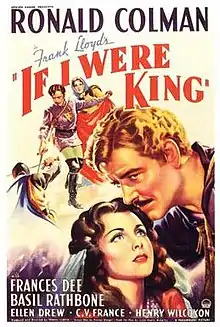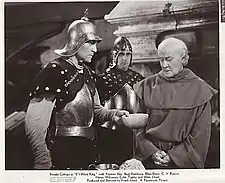If I Were King
If I Were King is a 1938 American biographical and historical film starring Ronald Colman as medieval poet François Villon, and featuring Basil Rathbone and Frances Dee. It is based on the 1901 play and novel, both of the same name, by Justin Huntly McCarthy, and was directed by Frank Lloyd, with a screenplay adaptation by Preston Sturges.
| If I Were King | |
|---|---|
 1938 US theatrical poster | |
| Directed by | Frank Lloyd |
| Produced by | Frank Lloyd |
| Written by | Preston Sturges |
| Based on | the 1901 novel and play, both titled If I Were King by Justin Huntly McCarthy |
| Starring | Ronald Colman Basil Rathbone Frances Dee |
| Music by | Richard Hageman Milan Roder (uncredited) |
| Cinematography | Theodor Sparkuhl |
| Edited by | Hugh Bennett |
| Distributed by | Paramount Pictures |
Release date |
|
Running time | 101 minutes |
| Country | United States |
| Language | English |
| Box office | $1.8 million (rentals)[1] |
Plot
In Paris, which is besieged by the Burgundians, François Villon (Ronald Colman) is the despair of Father Villon, the priest who took him in and raised him. Father Villon takes François to mass after his latest escapade (robbing a royal storehouse). There François spies a beautiful woman, Katherine DeVaucelles (Frances Dee). Entranced, he tries to strike up an acquaintance with her, reciting some of his poetry to her. On the surface, she is unmoved, but when soldiers come to take him into custody, she provides him with an alibi.
King Louis XI of France (Basil Rathbone) is in desperate straits. He suspects that there is a traitor in his court. He goes in disguise to a tavern to see who accepts an intercepted coded message from the enemy. While there, he is amused by the antics of poet François Villon. The rascal criticizes the king and brags about how much better he would do if he were in Louis' place.
The traitor is revealed to be Grand Constable D'Aussigny (John Miljan), but before he can be arrested, the turncoat is killed in a brawl by Villon. The King is now of two minds about what to do, since the traitor has been revealed by Villon. As a jest, Louis rewards Villon by making him the new Constable, though the king secretly intends to have him executed after a week.
His low-born origin kept a secret, Villon falls in love with lady-in-waiting Katherine DeVaucelles and she with him, not recognizing him as Villon. Then Louis informs Villon about his grim fate. Soon François finds out how difficult it is to make the army attack the besieging forces, even after he has the king's storehouses release the army's last six months of food to the starving population of Paris-- giving the army the same short schedule for attack as the people.
Villon finally escapes the palace, but when the Burgundians break down the city gates, he rallies the common people to rout them and lift the siege. He is then arrested again.
The king has had to put up with Villon's impudence, but he and Villon now have some grudging respect for each other, with Villon admitting to the king that Louis' job is harder than he had thought. The king on his side has been convinced by Katherine and Father Villon of François's role in saving the city, and now feels obligated to reward him again. But wanting less aggravation in his life, Louis decides to pardon Villon, but exile him from Paris. Villon is supposed to see Katherine on his way out, but decides to bypass her. This does no good. François leaves on foot, headed for the south of France. Lady Katherine squeezes this information from Father Villon and follows with a guard in her carriage at a discreet distance on the road, waiting for François to tire out.
Cast
- Ronald Colman as François Villon
- Basil Rathbone as King Louis XI
- Frances Dee as Katherine DeVaucelles
- Ellen Drew as Huguette, Villon's girlfriend
- C.V. France as Father Villon
- Henry Wilcoxon as Captain of the Watch
- Heather Thatcher as the Queen
- Stanley Ridges as Rene de Montigny
- Bruce Lester as Noel de Jolys
- Alma Lloyd as Colette
- Walter Kingsford as Tristan l'Hermite
- Sidney Toler as Robin Turgis
- Colin Tapley as Jehan Le Loup
- Ralph Forbes as Oliver le Dain
- John Miljan as Grand Constable Thibaut D'Aussigny
- William Haade as Guy Tabarie
- Adrian Morris as Colin de Cayeulx
- Montagu Love as General Dudon
- Lester Matthews as General Saliere
- William Farnum, as General Barbezier. He starred as Villon in the first, silent film version of If I Were King, made in 1920.[2]
- Paul Harvey as Burgundian Herald
- Barry Macollum as Storehouse Watchman
- May Beatty as Anna
- Winter Hall as Major Domo
- Francis McDonald as Casin Cholet
- Ann Evers as Lady-in-Waiting
- Jean Fenwick as Lady-in-Waiting
Darryl Hickman made his film debut in the uncredited role of a child.
Production

Nine months in France were required to prepare for If I Were King, and the French government cooperated by allowing a replica to be made of the Louvre Palace throne.[3]
Whether Preston Sturges, who at the time was Paramount's top writer,[4] had a collaborator in writing the script is unclear: some early drafts have the name "Jackson" on them as well as Sturges', but the identity of "Jackson" has not been determined. In any event, Sturges finished a draft by February 1938.[3] The final screenplay included Sturges' own original translations of some of Villon's poems.[5]
The film was in production from 12 May to mid-July 1938.[6] Ralph Faulkner, who played a watchman, acted as stunt coordinator and coached the actors on swordplay, and about 900 extras were used for the battle scenes, one of which was cut by the director after the film had opened.[3][4]
Accolades
If I Were King was nominated for four Academy Awards:[7][8]
- Supporting Actor - Basil Rathbone
- Art Direction - Hans Dreier and John B. Goodman
- Music, Original Score - Richard Hageman
- Sound, Recording - Loren L. Ryder
Hans Drier was also nominated for an Academy Award for his work on the 1930 film The Vagabond King, which was a musical version of the same story.[9]
Other versions
There is no connection, apart from the title, between the story and the 1852 comic opera by Adolphe Adam called Si j'étais roi (English: If I Were King).
McCarthy's play premiered on Broadway in 1901 and was revived five times up through 1916.[10] It was first adapted in 1920 as a silent film.[2]
In 1925, composer Rudolf Friml and librettists Brian Hooker and W.H. Post turned it into a successful Broadway operetta, The Vagabond King, which featured the songs "Only a Rose", "Some Day", and "Song of the Vagabonds".[11] The operetta was filmed twice - in 1930, starring Jeanette MacDonald and Dennis King[9] and in 1956, directed by Michael Curtiz.[12] Both film versions used only a little of Friml's original score.
The François Villon story was also filmed in 1927 under the title The Beloved Rogue, with John Barrymore in the lead role.[13]
The film was adapted as a radio play on Lux Radio Theater October 16, 1939 with Douglas Fairbanks Jr.. Academy Award Theater adapted it on May 11, 1946 with Colman reprising his part.
Popular Tamil actor-turned-politician M.G. Ramachandran, after watching and being inspired by this movie, decided to act, produce and direct Nadodi Mannan (English: The Vagabond King) in 1958, which turned out to be a huge milestone in his career, paving the way for him to become Chief Minister of Tamil Nadu 19 years later.
References
- "All-time Film Rental Champs". Variety. October 15, 1990.
- If I Were King (1920) at IMDb
- TCM Notes
- Miller, Frank "If I Were King" (TCM article)
- Eder, Bruce Plot synopsis (Allmovie)
- TCM Overview
- "The 11th Academy Awards (1939) Nominees and Winners". oscars.org. Retrieved 2011-08-10.
- "NY Times: If I Were King". NY Times. Retrieved 2008-12-10.
- The Vagabond King (1930) at IMDb
- If I Were King at the Internet Broadway Database
- The Vagabond King at the Internet Broadway Database
- The Vagabond King (1956) at IMDb
- Beloved Rogue at IMDb
External links
- If I Were King at IMDb
- If I Were King at the TCM Movie Database
- If I Were King at AllMovie
Streaming audio
- If I Were King on Lux Radio Theater: October 16, 1939
- If I Were King on Academy Award Theater: May 11, 1946